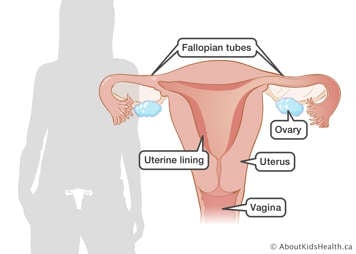What is menstruation?
Menstruation, or the menstrual cycle, is experienced by people with female reproductive systems and is the body's monthly process of preparing itself for a possible pregnancy. When a child with a female reproductive system reaches a certain age, they start to release blood from their vagina each month. This is called menstruation or a "period". When a young person starts to menstruate, they are able to get pregnant.
Most people who menstruate get their period about two years after the breasts start to form. This is usually when they are about 12 or 13 years old. Some children get the first period as early as nine years old, while others may not get it until they are in their mid teens.
The menstrual cycle
A cycle is the amount of time between a person's periods. Most people's cycles last between 21 and 35 days. The period itself can last anywhere from two to eight days. Periods and cycles are not regular when they first start. It can sometimes take more than two years for the cycle to regulate.
The menstrual cycle pattern
- People with female reproductive systems are born with all their eggs, which are stored in the ovaries. When a person with ovaries reaches puberty, an egg ripens once a month. The egg then leaves one of the two ovaries (ovulation).
- The ovaries release hormones. This creates a thick and cushioned uterus lining (endometrium).
- Around the time of ovulation, the uterus is ready for a possible pregnancy. If your child has unprotected vaginal sex around this time, a sperm may fertilize an egg. The egg travels to the uterus and attaches to the cushiony wall. Then it slowly develops into a baby.
- An unfertilized egg does not attach to the wall of the uterus. The uterus flushes away the extra tissue lining. The menstrual flow or period includes the unfertilized egg, unused blood and tissue. It leaves the uterus, flows through the vagina and out of the body.

Adjusting to change
Menstruation is normal and healthy. People who menstruate can still enjoy swimming, running and all of their normal activities. When the period arrives, mark the time on a calendar. Remember that the period can take several years to become regular. Make sure your child has pads readily available and knows how to use them. Most people who menstruate do not use tampons for their first period but will learn how to use them with time. Cramps and discomfort are common.
Managing the pain
Over-the-counter medicines, such as ibuprofen, can relieve painful cramps. If these medicines do not help, talk to a doctor. Stronger medicine requires a prescription. Birth control pills can also help decrease painful periods. Exercise and other physical activity can help relieve the pain.
What you can do to help your child
Talk openly
Encourage your child to ask questions without fear or judgment. If your child's friends and the Internet are their only sources of education, they may receive some poor advice. You can start the conversation by asking them what they know about puberty. Offer as much information as you think they need to know. If your child has not brought up the topic as they near their preteen years, it is up to you to initiate the conversation. You may want to discuss basic hygiene, sexual maturity and teenage pregnancy.
When to seek medical help
Make an appointment with your child's doctor if:
- their periods last more than seven days
- over-the-counter medicines do not relieve their menstrual cramps
- they are soaking more pads or tampons than usual
- they are missing school or other activities because of painful or heavy periods
- they go three months without a period once periods have become regular
- they may be pregnant
- they haven't started menstruating by age 15